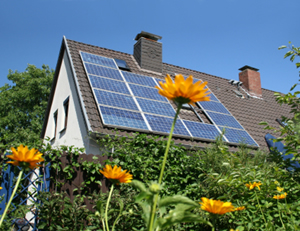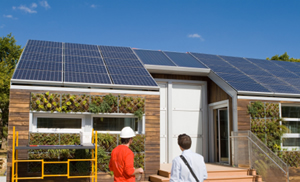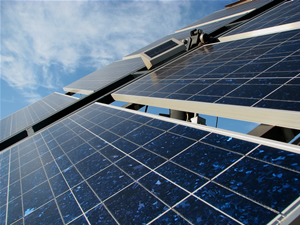Green Building in Portland Oregon
 Green building is the practice of creating structures and using processes that are environmentally responsible and resource-efficient
throughout a building's life-cycle from Planning to design, construction, operation, maintenance, renovation and deconstruction. This practice
expands and complements the classical building design concerns of economy, utility, durability, and comfort. Green building is the practice of creating structures and using processes that are environmentally responsible and resource-efficient
throughout a building's life-cycle from Planning to design, construction, operation, maintenance, renovation and deconstruction. This practice
expands and complements the classical building design concerns of economy, utility, durability, and comfort.
Green building is also known as a sustainable or high performance building For example, green buildings may incorporate sustainable
materials in their construction (e.g., reused, recycled-content, or made from renewable resources); create healthy indoor environments with
minimal pollutants (e.g., reduced product emissions); and/or feature landscaping that reduces water usage (e.g., by using native plants that
survive without extra watering).
By adopting green building strategies, we can maximize both economic and environmental performance. Green construction methods can
be integrated into buildings at any stage, from design and construction, to renovation and deconstruction. However, the most significant
benefits can be obtained if the design and construction team takes an integrated approach from the earliest stages of a building project.
Call today! 503-826-9462 or email Randy@CranstonBuilds.com
 Environmental benefits Environmental benefits
- Enhance and protect biodiversity and ecosystems
- Improve air and water quality
- Reduce waste streams
- Conserve and restore natural resources
Economic benefits
- Reduce operating costs
 Create, expand, and shape markets for green product and services Create, expand, and shape markets for green product and services- Improve occupant productivity
- Optimize life-cycle economic performance
Social benefits
- Enhance occupant comfort and health
- Heighten aesthetic qualities
- Minimize strain on local infrastructure
- Improve overall quality of life
Mission: Protect human health, the environment and the beneficial uses of Oregon's natural resources. To work cooperatively with DEQ's
vision and all Oregonians for a healthy sustainable environment. Also be a leader in restoring, maintaining and enhancing the quality of
Oregon's air, water and land.
Responsibilities

- Pollution prevention
- Minimize and control run off
- Drainage systems for construction washing
- Preserve wetlands, streams, lakes, trees and meadows
- Maintain soil function and existing vegetation
- Ensure air quality health standards
- Identify asbestos containing materials
- Control dust emission
- Control noise pollution
- Solid waste recycling and recovery
- Proper management of environmentally hazardous waste
- Reduce the use of toxic chemicals
- Reduce vehicle emissions
- Deter radon entry
- Identify illegal drug labs
- Conserve natural resources
Environmentally Hazardous Materials
- Asbestos- friable and non-friable
- Refrigerants- (CFCs) chlorofluorocarbons and (HCFSs) hydrofluorocarbons
- Batteries
- Mercury containing lamps, thermostats and switches
- Pesticides, Lead, lead based paint (before 1978)
- (PCBs) Polychlorinated biphenyls - capacitors, switches regulators (before 1979)
- Used oil
Planning
Estimate the types and amounts of waste you will produce in each project and determine the best way to manage each. Make sure everybody on the job is aware of that plan and is following it. Mark recycling areas and include lists of what is accepted and what is prohibited for each material that is separated for recovery. Determine what waste is hazardous and could pose danger to human health, property or the environment.
Get your free estimate today! Call 503-826-9462
or email Randy@CranstonBuilds.com
|

